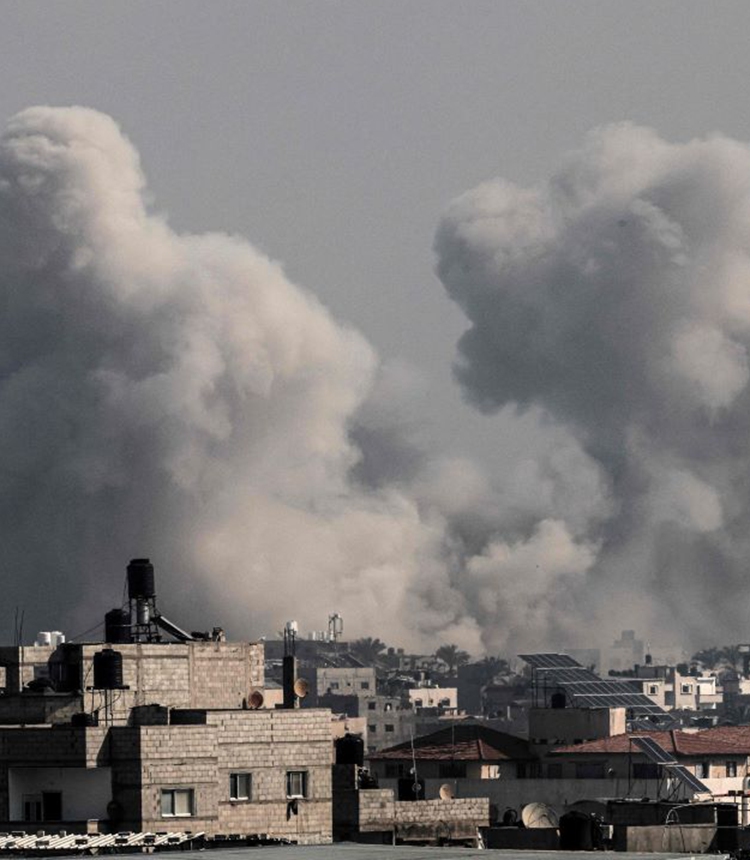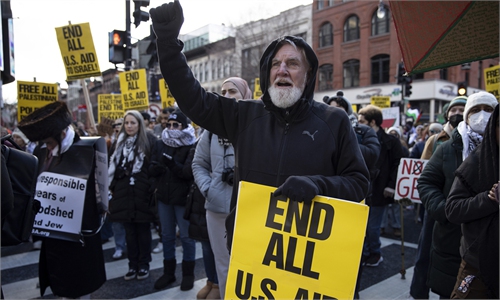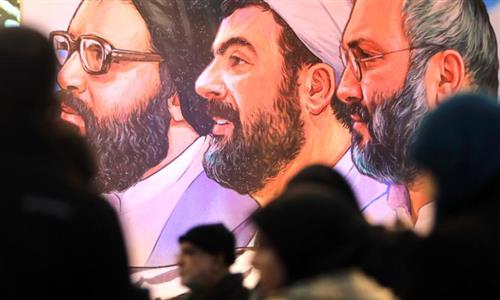GT survey: 31 percent of global respondents believe Palestine-Israel conflict could escalate into a larger Middle East war

Smoke billows over the southern Gaza Strip during Israeli bombardment on December 17, 2023, amid continuing battles between Israel and Hamas. Photo: AFP
A global survey conducted by the Global Times Institute at the end of 2023 showed that 31 percent of global respondents believed that the latest round of Palestine-Israel conflict that broke out on October 7 was very likely to escalate into a larger Middle East war, indicating growing concern across the world over the worsening situation as well as difficulties in successfully calling for a complete ceasefire.
According to the survey released on Thursday, among those who were aware of the Palestine-Israel conflict, 61 percent did not want to see the conflict happen. More than 60 percent of respondents in Middle Eastern countries such as Saudi Arabia and Egypt also affirmed that Chinese mediation would help resolve the Palestine-Israel issue, according to the survey.
The Palestine-Israel conflict is a humanitarian disaster no one would like to see. The survey results showed that China stands with most of the people in the world, wishing for an early and peaceful resolution to the conflict, Niu Xinchun, executive director of the China-Arab Research Institute of Ningxia University, told the Global Times on Sunday.
According to data released by the United Nations Office for the Coordination of Humanitarian Affairs, as of Monday, more than 30,000 people (29,514 Palestinian and more than 1,200 Israeli) have been killed since October 7, 2023, with nearly 70,000 being injured and 1.7 million being replaced in Gaza.
Growing concern
The survey was conducted between November and December 2023, receiving nearly 17,000 responses from 20 countries across the world.
Among the respondents, 89 percent indicated awareness of the event, with the exception of Saudi Arabia at 71 percent; all other 19 countries had more than 85 percent of respondents reported awareness of the conflict.
Among those aware of the Palestine-Israel conflict, 61 percent stated they did not want to see the event happen or wished it had not occurred, and 25 percent held a neutral stance. Looking at the responses by country, except for the Philippines (41 percent) and India (34 percent), more than half of the respondents in the remaining 18 countries did not wish to see the conflict happen, with Japan having the highest proportion at 82 percent, and Russia, the UK, Argentina, and China also exceeding 70 percent. Approximately 40 percent of respondents in the Philippines and India held a neutral stance.
Li Haidong, a professor at the China Foreign Affairs University, told the Global Times on Sunday that if the Israel-Palestine conflict does not end quickly, its spreading effect will become increasingly obvious, primarily affecting neighboring countries and the entire Middle East. The ongoing conflict is exacerbating existing crises and contradictions, leading to further deterioration of the situation rather than the generation of a resolution.
This situation could halt the reconciliation process between Israel and Saudi Arabia, accelerate the peace process between Saudi Arabia and Iran, and unite the Arab and Islamic worlds against Israel, thereby complicating the regional dynamics further, Li noted.
In the majority of Western countries, including Australia, the US, the UK, France, Germany, and in three African countries, not less than 30 percent of respondents believe the conflict will expand into a larger Middle East war, with Indonesia registering the highest responses in the affirmative at 44 percent, and Turkey, Kenya, and South Africa following close behind at 40 percent, the survey showed.
To alleviate the humanitarian crisis in Gaza and achieve a ceasefire as soon as possible, China has and continues to actively engage in mediation along with the United Nations and the international community, aiming to de-escalate regional conflicts.
It is under China's presidency, that Resolution 2712, the first resolution since this round of Palestine-Israel conflict broke out on October 7, was adopted by the United Nations Security Council on November 15. It was also the first UNSC resolution on the Palestine-Israel issue since the end of 2016.
According to the Global Times survey, more than 60 percent of respondents in Saudi Arabia and Egypt affirm that China's mediation is contributing to resolving the Israel-Palestine issue.
The data shows that over half (54 percent) of respondents from Saudi Arabia, Egypt, Russia, and the US affirmed China's positive role in mediation, 23 percent thought it has little effect (including "not very useful" and "completely useless"), and another 23 percent found it the question difficult to answer.
According to Li, survey results indicate a majority support in both the US and other countries for China's mediation in the Palestine-Israel conflict, reflecting China's position on the side of international justice.
US respondents affirmed China's positive role at 43 percent, while 34 percent denied the effectiveness of China's efforts, according to the survey.
"In the US, the close ratio of support to opposition highlights deep societal divisions, including political, social, and religious differences," he said, noting that this division suggests a significant split within the US, affecting its foreign policy and international image.
Irresponsible US
Another survey by the Global Times Research Institute at the end of 2023 in China showed that more than half of Chinese respondents thought the US' performance in the Palestine-Israel conflict is irresponsible. Over 40 percent (42 percent) view it as unethical, nearly 40 percent (39 percent) find it unjust, and 36 percent believe the US has hindered the resolution of the conflict.
Li points out that the US shows irresponsibility in the conflict through inconsistent actions and rhetoric, offering continuous military support to Israel despite advocating for a ceasefire, and exacerbating regional conflicts, especially with relation to Iran.
The US also engages in military actions in the Middle East, demonstrating a reliance on military force and contributing to regional instability. These actions highlight a disconnect between the US' stated objectives and its actual practices, leading to increased caution and resistance from the international community.
The US' stance is contrary to the global consensus by partially supporting Israel and prioritizing its own political aims over humanitarianism, Niu pointed out.
Such support has tarnished the US' international image and also sowed discord within the US government, experts noted.
Moreover, more than 40 percent of Chinese respondents believe the US cannot handle both the Russia-Ukraine conflict and the Palestine-Israel conflict simultaneously. In Russia, 64 percent of respondents think the US cannot handle both conflicts, a proportion that exceeds half of respondents in Japan, Indonesia, South Africa, and nearly half of all respondents in China and Argentina.
Li criticizes the US strategy of engaging in multiple conflicts simultaneously as "foolish, often leading to failure." Li argues that US political elites hold "an inherent, delusional, arrogant, and prejudiced selfishness regarding America's capability to engage in conflicts," leading to the destructive use of resources and exacerbating conflicts.
The international behavior of the US is often criticized for creating conflict and turmoil rather than fostering peace, prosperity, and stability, Li emphasized, noting that the actual actions of the US have had a negative impact in the Middle East and globally, a practice that is unpopular within the international community.
Talks about a humanitarian cease-fire in the Israel-Palestine conflict made "significant progress" during a meeting with representatives from Israel, the US, Qatar, and Egypt in Paris on Saturday, Israeli media outlet Haaretz reported, citing anonymous sources familiar with the details of the meeting.
Haaretz also cited an unnamed Israeli foreign diplomat who said that "the talks are progressing" and as "all parties are showing flexibility, a deal can be reached before [the holy month of] Ramadan," which starts on March 10.
Even if a hostage deal is reached, it would only "delay" an assault on the crowded city of Rafah, Israeli Prime Minister Benjamin Netanyahu was quoted as saying by Al Jazeera. Netanyahu stressed that the offensive "will happen."
"The Paris meeting is indeed significant progress. The progress was based on compromises and concessions from both the Hamas armed group and Israel. But it is still uncertain whether the negotiations can be concluded quickly as Hamas did not participate in the talks in Paris, so the next step is for Egypt and Qatar to report the results of the negotiations to Hamas, and then listen to Hamas' opinions," Niu said.
Niu warned that the possibility for a total ceasefire is still slim given Israel's determination to destroy the Hamas armed group, not to mention the US' irresponsible behavior regarding the issue, by using the Palestine-Israel conflict as well as the Russia-Ukraine conflict as tools for its domestic partisan conflicts, by placing its own political aims above humanitarianism.




